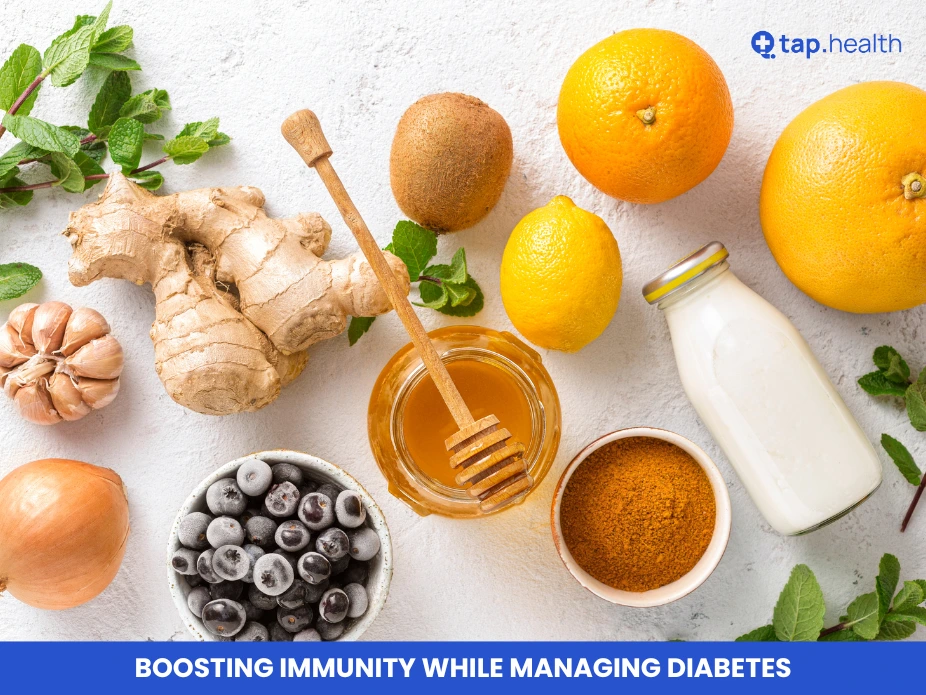Understanding Diabetes and Immune System Connection
Diabetes weakens the immune system, making individuals more prone to infections like urinary tract issues or respiratory illnesses. High blood sugar impairs white blood cells, while chronic inflammation hinders immune response. Boosting immunity while managing diabetes is essential to lower infection risks and enhance overall health.
People with diabetes often face frequent colds or skin infections due to compromised immunity. Controlling blood sugar stabilizes immune function, reducing vulnerability.
Nutrient-Rich Diet for Diabetes Immune Boost
A balanced diet supports immune health and blood sugar control. Focus on vitamins for diabetes immunity.
- Vitamin C Sources: Oranges, strawberries, bell peppers stimulate white blood cells.
- Vitamin D Benefits: Salmon, fortified foods regulate immunity; low levels common in diabetes.
- Zinc-Rich Foods: Pumpkin seeds, chickpeas aid immune cell development.
- Antioxidants in Diet: Berries, spinach combat oxidative stress and inflammation.
- Omega-3 Fatty Acids: Fish, walnuts reduce inflammation, improve cholesterol.
- High Fiber Options: Oats, beans promote gut health, linked to 70% of immunity.
Plant-based whole foods provide essential nutrients without spiking blood sugar.
Exercise to Enhance Immunity in Diabetes
Regular physical activity boosts immune response and insulin sensitivity.
- Increases immune cell production.
- Lowers blood glucose levels.
- Reduces chronic inflammation.
Aim for 150 minutes moderate exercise weekly: walking, swimming. Add strength training twice weekly for muscle mass and stable sugar levels.
Exercise for diabetes immunity prevents complications, improves recovery from illnesses.
Sleep, Stress Management for Blood Sugar and Immunity
Poor sleep raises cortisol, spiking blood sugar and suppressing immunity. Target 7-9 hours nightly.
Stress reduction techniques:
- Meditation
- Yoga
- Deep breathing
These lower inflammation, support immune cells, and aid diabetes control.
Hydration Tips for Diabetic Immune Health
Dehydration elevates blood sugar, weakens infection fighting. Drink 8-10 glasses water daily.
Avoid sugary drinks; choose herbal teas or infused water. Proper hydration maintains immune efficiency.
Lifestyle Changes: Quit Smoking, Limit Alcohol
Smoking damages immune cells, impairs circulation. Quitting enhances diabetes management.
Excess alcohol raises blood sugar, hinders immunity. Moderate intake only.
Monitoring Blood Sugar and Regular Check-Ups
Track glucose frequently; keep HbA1c under 7%. Partner with healthcare providers for immune assessments.
Real-Life Diabetes Immunity Success Story
Mark, 55 with Type 2 diabetes, faced recurrent infections. He adopted nutrient-dense meals, exercise, and stress relief. Within months, fewer illnesses, better blood sugar, improved vitality.
Expert Insights on Immunity Boosting in Diabetes
Dr. Laura Green, immunologist: “Lifestyle tweaks in diet and exercise significantly strengthen immunity for diabetes patients.”
Dr. Emily White, endocrinologist: “Stable blood sugar optimizes natural defenses, speeding illness recovery.”
Research-Backed Facts on Diabetes and Immune Health
- Antioxidant diets improve immunity (American Journal of Clinical Nutrition).
- Exercise reduces inflammation (Journal of Diabetes Research).
- Optimal Vitamin D lowers infection risks (Diabetes Care).
Consult providers before changes.
FAQ: Boosting Immunity While Managing Diabetes
Q1: How does diabetes weaken immunity?
High blood sugar impairs white blood cells; inflammation reduces response.
Q2: What foods boost immunity for diabetics?
Vitamin C-rich fruits, zinc sources, antioxidants stabilize sugar and fight infections.
Q3: Does exercise help diabetes immune function?
Yes, boosts cells, controls glucose, cuts inflammation.
Q4: How to reduce stress for better immunity and diabetes control?
Yoga, meditation lower cortisol, enhance defenses.
Q5: Why monitor blood sugar for immune health?
Prevents highs that weaken immunity; regular checks catch issues.
Adopt these strategies via TapHealth for personalized diabetes management.
How Can TapHealth Help with Diabetes and Immunity Boosting?
TapHealth offers tools for tracking blood sugar, diet plans with immune nutrients, exercise reminders, and stress modules. Integrate these for fewer infections and optimal health.
References
National Institutes of Health – Vitamin C Health Professional
Vitamin C – NIH
National Institutes of Health – Vitamin D Health Professional
Vitamin D – NIH



